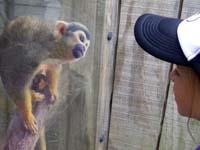Fundamentally person
However, they have not considered it exhausted and continue to reflect on it. Now, for example, the scientific journal Nature has published a series of essays. With these articles they wanted to explain how the latest research is changing our knowledge and vision of us.

What does it do to the person? What sets us apart from other living beings?
(Photo: John Glenn)
In fact, research helps spread our knowledge about our species, but it cannot be said that all responses have been obtained through them. Nor, perhaps, will they succeed. As they recognized in the editorial they published in Nature, it is not easy. For example, the researchers involved have found that it is very important to know how our first ancestors, hunter-gatherers who lived thousands of years ago, were to understand many of our current behaviors. But research on these human beings goes little by little and the results are limited.
There are other types of difficulties, such as the relationship between different disciplines or research areas. Or rather, what has not been. In fact, politics, ethics, philosophy and other types of knowledge try to answer the question, but many scientists have not taken into account the answers they have found. And vice versa: In the 1970s and 1980s, biological explanations of gender role, religion or homosexuality were discarded, among other things, for the risk of being used to justify injustices in society.
From religion
Since then several years have passed and now the editors of the journal Nature have expressed their intention to foster dialogue between disciplines. Thus, the first attempt focuses on religion. The author is Pascal Boyer, a professor in the Department of Psychology and Anthropology at the University of Washington, who states that atheism is more difficult to sell than religion, and so it will always be, because we have a natural tendency to faith.
In the essay, Boyer argues his hypothesis. However, given the number of responses generated by the web forum, it is clear that the debate has not ended.
Other attempts have not sparked so much debate, although their themes are as important as religion to understand the essence of our species: speech, altruism and conflict, generosity, migration, love, race...
In the last essay of the series, Melanie Moses, from the Department of Informatics at the University of New Mexico, has focused on one of humanity's great challenges: how to reduce energy needs, with a growing dependence on energy in today's complex societies. In his search for response, Moses has analyzed social networks, compared population measures, resource consumption efficiency, etc. with those of other mammals.
We are undoubtedly the only species that consumes so many resources, so will it also be one of the characteristics that makes us be people? It is not my intention to advertise, but if you ask questions of this type, and you want to read more questions and some of the answers that you have given, you can consult them on the website of Nature. However, it will be difficult to find definitive answers...
Published in Gara
Buletina
Bidali zure helbide elektronikoa eta jaso asteroko buletina zure sarrera-ontzian











